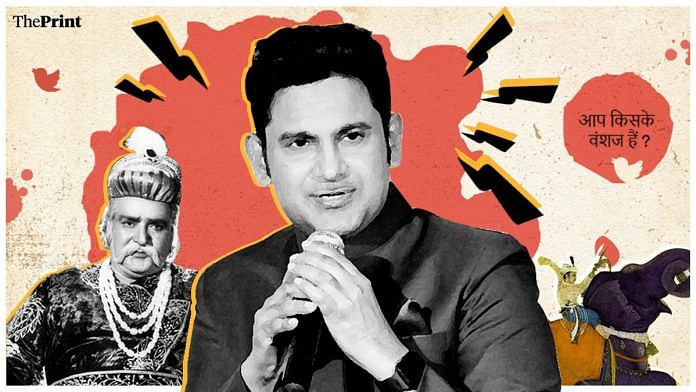New Delhi: A Hindi cinema lyricist recently made headlines for a controversial Twitter video in which he has called Mughal rulers Akbar, Humayun, and Jahangir “dacoits”, and said that India has been “brainwashed” into naming roads after them.
Manoj Muntashir’s video, ‘Who are your ancestors‘ was uploaded on Twitter on 24 August and has since gone viral.
Muntashir, who has written lyrics for films such as Kesari and Bhuj: The Pride Of India, followed this up with an interview to a TV channel, where he said the history of medieval India is “deliberately coloured” and that “90%” of it had been written by Left-wing historians with an “agenda”.
Speaking to ThePrint, Dr S. Irfan Habib, (retired) Maulana Azad Chair, National Institute of Educational Planning and Administration, New Delhi, said: “These things are so nonsensical that they are not even worth talking about. There is great jingoism in what he (Muntashir) is saying. The media is only providing it unnecessarily legitimacy.”
Muntashir’s reading of history and his description of Mughal rulers as dacoits, Habib said, reflects the views of “those who have no familiarity with history, who are prejudiced … dacoits tend to carry their loot with themselves, Mughals did not flee with any treasures.”
ThePrint reached Muntashir for a comment on the controversy via email, but did not receive a response till the time of publishing this report.
Mughals versus the East India Company
Habib drew a comparison with the East India Company to explain his point. “William Dalrymple has written a book on the East India Company, in which he has described the East India Company as a robber. This is because the British had nothing to do with India. They took away precious goods. We can definitely call them dacoits.”
Akbar’s Mansabdars Mansingh and Jaisingh, both Rajputs, were key Mughal officials, pointed out the historian. “The entire Mughal Empire was a collaborative project, which he (Muntashir) does not know. There were many people whom the Mughals did not remove from power at all, they only used to collect taxes from them and they remained kings of their estates,” he added.
In his TV interview, Muntashir also raised hackles by saying that in films, “it is often shown that Jodha-Akbar’s love was like that of Krishna and Radha, which is quite shameful. Jodha was the third queen of Akbar, and he had 40 more in his harem”.
Habib pointed out the fallacy of looking at historical figures outside their time and out of context. “You cannot look for a hero in medieval India for the 21st century. If today you start reading history out of that context, you will certainly court trouble,” he added. On the Radha-Krishna and Jodha-Akbar relationships, he said, “There is no comparison at all between the two. At least no historian has done this till date.”
He also added that “no Muslim gets offended by remarks on Akbar, Babur”, but that their history should not be misrepresented.
Also read: Yogi Adityanath imposes ban meat, liquor sale in Mathura, says traders can sell milk instead
‘Why was Akbar speaking in Urdu in Mughal-e-Azam?’
In the TV interview, Muntashir also commented on Akbar speaking eloquently in Urdu in a film like Mughal-e-Azam, “when Urdu was not even spoken during Akbar’s time,” to which historians have responded saying that a similar case then can be made out against teleserials based on the Ramayana and Mahabharata as well.
“They were made in Hindi which then may seem wrong. Hindi was also not spoken at that time,” said Habib.
Aditya Mukherjee, (retired) Professor of Contemporary History, JNU, rubbished Muntashir’s video saying that “if you have to find something in the drain, then you will get the stench too.” He also referred to recent attempts to “remember the horrors of Partition which has already been forgotten. You will get the same only by reimagining the hatred and resentment of that time.”
On Muntashir’s objection to calling Mughals nation-builders, Mukherjee said: “’You want to reject all which you do not like. History has to be read and understood within a frame of discipline. The world’s top-notch scholars have written about it. How can you dismiss it outright?”
Mukherjee also weighed in on the charge of left-wing historians’ distortion of history saying that, “The ICHR (Indian Council for Historical Research) has put up a poster celebrating ‘Azadi ka Amrit Mahotsav’ in which Jawaharlal Nehru has been conspicuously left out. His 9 years in British jails were in vain. Instead, they put a photo of V D Savarkar who apologised to the British in the most shameful and degrading manner. Is this not a distortion of history?”
Actor Richa Chadha and director Neeraj Ghaywan were among those in the film fraternity who called the lyricist’s comments “problematic”.
(Edited by Paramita Ghosh)
Also read: Hindutva founders did little for azadi. Hijacking history in ICHR poster is what BJP can do



